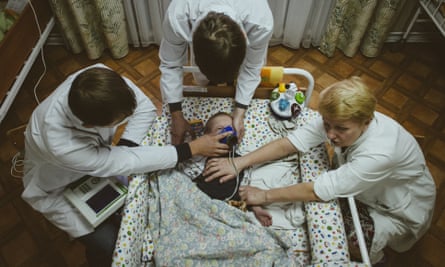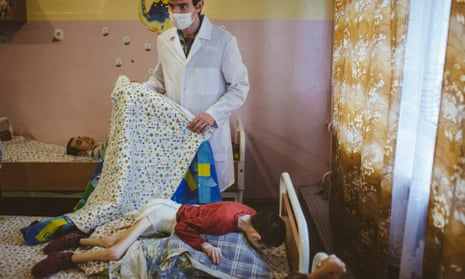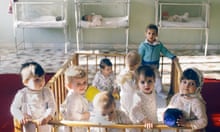Almost 100 children and young people have been found on the brink of starvation in orphanages in Belarus, prompting widespread public revulsion and a criminal investigation.
Prosecutors, doctors and officials from children’s homes have revealed that clusters of severely malnourished youngsters have languished in the homes for years. Some teenagers weighed as little as 15kg (2st 5lb) and one 20-year-old was just 11.5kg.
Images from the homes in the capital, Minsk, recall other episodes of neglected children in the region, particularly the Romanian orphan scandal of the early 1990s. Many are too gruesome for the Guardian to publish.
The authorities have launched an investigation into how children ended up in such a life-threatening state. Prosecutors say they are the victims of neglect and malnutrition, and that several orphanage directors have been fired.
Orphanages have countered by saying that the children’s physical frailty is born of psychological problems.

“These children have never walked. They are constantly in bed. They don’t have muscles,” said the director of the Cherven orphanage, Ella Borisova. “Their legs are toothpicks covered with skin.
“Such a child will never stand up and walk with or without enteral [special calorie-rich] nutrition. So, for our institution the fact that this child is clean, dry, fed and gets medical help in time is the most important thing.”
The scandal broke when a paediatrician from one of the affected institutions invited journalists to cover a charity football match to raise money for specialist nutrition for orphans. “Enteral” food is densely packed nourishment designed for underweight patients that is often delivered via a tube directly to the stomach.
The photos of raw-boned children from one of the Minsk orphanages published by the online magazine Imena shocked Belarusians. The magazine reported that one 20-year-old woman weighed 11.5kg – the normal weight of a two or three-year-old child.
Revolted readers likened the images to wartime Nazi victims. “As if you are in Buchenwald concentration camp,” was one comment. “How can it be that in the centre of Europe in the 21st century there is no proper food for sick children?” another reader asked.
The answer is not clear. Some orphanages said children simply did not hold down normal food, but that there was no money for nutrition-rich supplies that might have enabled them to gain weight. Others, such as Borisova, said that even with enteral nutrition they would not gain a normal physique.
The deputy director of another orphanage, Marina Fedorenchik, said: “These children are brought to us to stay the rest of their lives. The majority of them were given up for adoption at birth. All of them have sufficient congenital mental disability coupled with the nasty form of cerebral palsy or other congenital pathologies.”

In cases where orphanages provided high-nutrition feed for their children, improvements were noticed. But a paediatrician had to prescribe it formally for the homes to be able to buy it with public money. That was possible only after a detailed medical examination of the children. However, the hospitals responsible for this did not pay due attention to children considered to have no future, officials said. Bureaucratic logjams did not help the situation.
Local doctors failed to attract the attention of authorities and government officials. Alexy Momotov, a paediatrician at one of the Minsk orphanages, tried to raise money for better nutrition via posts on Facebook. “We tried to organise a festival but nobody came,” he said.
The prosecutor’s office told local media: “The principal breach of the law was in the fact that the children were deprived of the required medical nutrition not only in the Minsk orphanage but also in other orphanages.” Two orphanage directors were dismissed and a third received a reprimand. “The directors are the people in charge of the procurement of the orphanages,” the prosecutor’s office said.
“If regular medical checks involving dedicated experts had taken place, the abnormal condition of the children would have been obvious,” it added.

One orphanage director, Vyacheslav Klimovich, blamed the situation on the psychological state of the children themselves. “The reason why they do not put on weight lies not in the malnutrition but in their psyche. There is no accessibility as there is no brain there. They have absolutely different processes.”
Pavel Burykin, a paediatrician, said this attitude had to change. “We can help any child if our prime goal is to improve the quality of his life,” he said.
Anna Gorchakova, director of a children’s hospice, believes the scandal arose not only because of poor institutional management but also because of the common attitude to severely ill children. “They are fed, looked after, but they are treated as plants,” she said.



